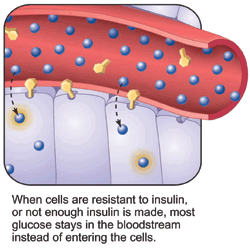Type 2 Diabetes
Understanding Type 2 Diabetes
To get energy, the body breaks food down into fuel. When a person has diabetes, the body has trouble using the fuel that it takes in. To better understand how to manage your diabetes, learn how the body gets energy.
How the Body Normally Gets Energy

After a meal or snack, digestion breaks down part of the food into a fuel called glucose (a type of sugar). Glucose leaves the digestive tract and enters the bloodstream. This makes the body's blood glucose level (also called blood sugar level) begin to rise.
Glucose Travels to the Cells
Glucose travels to the cells to be burned as fuel. When it arrives, it needs help to get into the cells.
Insulin Unlocks the Cells
Glucose needs insulin to enter the cells. When the blood glucose level rises, the pancreas releases insulin into the blood. Insulin then travels to the cells. There it acts like a key, unlocking the cells so glucose can enter. The cells then have glucose to burn for energy, and the blood sugar level stays steady.
When You Have Type 2 Diabetes
Type 2 diabetes makes it hard for the body to use glucose. Food is still changed into glucose. The glucose still travels in the bloodstream to the cells. But problems with insulin make it hard for glucose to enter the cells.
Problems with Insulin
Type 2 diabetes occurs because of one or both of the following problems with insulin:
- Cells are insulin resistant (they don't respond well to insulin).
- The pancreas does not make enough insulin.
Problems with Glucose

When the cells don't get enough glucose, the body doesn't have the energy it needs. That's why you may feel tired and rundown. With no place to go, glucose builds up in the bloodstream. This causes hyperglycemia (high blood sugar).
|
Risk Factors
No one knows exactly what causes type 2 diabetes. But we do know that certain behaviors and conditions, called risk factors, can make people more likely to develop it. Risk factors for type 2 diabetes include:
|